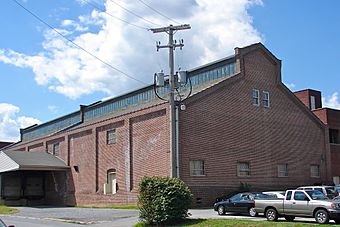Eisenlohr–Bayuk Tobacco Historic District facts for kids
Quick facts for kids |
|
|
Eisenlohr–Bayuk Tobacco Historic District
|
|

Eisenlohr–Bayuk Tobacco Historic District, August 2011
|
|
| Location | N. Water St., at W. Liberty St., Lancaster, Pennsylvania |
|---|---|
| Area | 4.8 acres (1.9 ha) |
| Architectural style | Tobacco Warehouse |
| MPS | Tobacco Buildings in Lancaster City MPS |
| NRHP reference No. | 90001397 |
| Added to NRHP | September 21, 1990 |
The Eisenlohr–Bayuk Tobacco Historic District is a special group of old buildings in Lancaster, Pennsylvania. It's like a historical neighborhood where many buildings were used to process and store tobacco leaves. This district is important because it shows how tobacco was handled in the past.
Contents
Exploring the Tobacco District
What Makes This Place Special?
A historic district is an area with many old buildings that are important together. They often share a history or a style of building. The Eisenlohr–Bayuk Tobacco Historic District is special because its buildings were all part of the tobacco industry. They helped turn tobacco leaves into cigars.
Buildings from the Past
This historic district includes 10 main buildings and one tall smokestack. These buildings are called "contributing" because they add to the historical importance of the district. They are all made of brick and are rectangular.
Who Built These Buildings?
- Otto Eisenlohr and Brothers: This company built five of the buildings between 1911 and 1921.
- Bayuk Cigar Co.: This company built four buildings between 1923 and about 1935.
- Jacob Reist Tobacco Warehouse: One building was built by Jacob Reist in 1923.
The Tall Smokestack
There is also a tall smokestack, about 50 feet high, built in 1923. Smokestacks were often used with boilers to create steam for heating or power in factories.
What Were the Buildings Used For?
All these buildings were used for processing and storing cigar leaf tobacco. This means they were places where tobacco leaves were prepared and kept safe before being made into cigars.
Why is it a Historic District?
The Eisenlohr–Bayuk Tobacco Historic District was officially added to the National Register of Historic Places in 1990. This means it is recognized as an important historical site in the United States.



